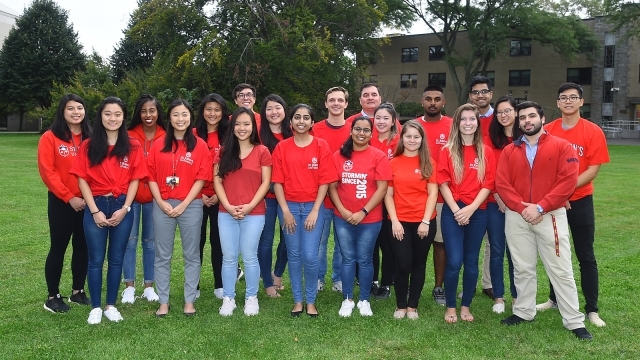
Communication and collaboration are key for pharmacists. Their profession revolves around providing clients with the best possible information about medications—their potential side effects, drug interactions, and correct administration. They often collaborate with doctors in providing direct care to patients. It was in that spirit that the College of Pharmacy and Health Sciences Student Congress at St. John’s University was created.
Established in 2018, the Congress has several mandates: coordinating student activities within the College of Pharmacy and Health Sciences; communicating matters of interest to students, administration, and faculty; serving as a conduit to the College administration regarding concerns of the student body; and discussing College-specific initiatives, decisions, and communications with its membership.
“Over the next few years, the College will continue to expand its programmatic offering, and the Student Congress will play a vital role in the offering of both extracurricular and cocurricular activities for the students in these program,” observed Joseph V. Etzel, Pharm.D., Associate Dean for Pharmacy Student Affairs, Associate Professor, and Associate Clinical Professor. Currently, he added, the Student Congress is in the process of developing an early mentoring program for freshman students aimed at augmenting retention and student success.
“Over the last two years, the student congress members have been successful at overseeing and planning numerous events including the Battle of St. Al’s, which focuses on bringing unity among the diverse programs, enhancing communication between faculty and students, and engaging in activities that develop professionalism and leadership skills,” stressed Diana J. Patino, Assistant Director of Administration and Student Activities, College of Pharmacy and Health Sciences.
The Congress is comprised of presidents and vice presidents from each student organization within the College, with one member serving as president. Pharm.D. candidate Francis “Frank” Ferraiuolo served as the organization’s first President and explained that organizations within the College were really not communicating beyond their memberships. “The mission,” he stressed, “is to bridge the communication gap between organizations, and between organizations and the administration. We also try to work more collaboratively on events.”
He added that there tended to be overlap between events hosted by different organizations within the College. “In the past, if we had just had a place and a means to talk to each other, we would have avoided the repetition, and a given event could have been bigger and more successful.”
Frank enjoyed being a point of contact between the various organizations and the administration and has a close relationship with several of the deans. He was able to bring student concerns to their attention and foster that collaborative spirit the Congress was meant to create. “After the first year, we were able to pull off a variety of different events that were vastly successful,” he recalled.
One such event was Giving Tuesday, a global day of giving that is held annually on the Tuesday after Thanksgiving. Frank noted that the Congress more than doubled the amount of money raised from $1,200 last year to $3,000 this year. “That’s an event I’m proud to say was purely student run,” he said. “All funds raised go toward student scholarships.”
Pharm.D. candidate Alexander Chung is current President of the Congress and was inspired to get involved after serving on Student Government, Inc. (SGI).
“SGI gave me a great opportunity to see the inner workings of the University and how students can make a difference.”
Alexander is President of the University’s Rho Chi Society chapter, which is the academic honor society for pharmacy. Currently, one of his main priorities is writing a constitution for the relatively new organization. “By creating this structure, our members see that if they participate, then they have a voice.”
He added, “On a day-to-day basis, my role is really about empowering the organizations that make up the Congress. We’re trying to help them find their niche on campus and their own identity,” he stressed. Each organization that is part of the Congress has a faculty advisor, and Alexander has made it a priority to meet with those faculty members to help spread the word about the organization.
He was also pleased to see the great success of this year’s Giving Tuesday event. “It’s nice to see our students becoming more hands-on with these events, realizing the importance of giving back.”
Ultimately, Alexander believes the Congress will enable its member organizations to shine a spotlight on the College. “I know the benefits of being a student at St. John's, and I want to share that. I want people to know St. John's is a great school—what attracted us was the reputation of the College of Pharmacy and Health Sciences.”
